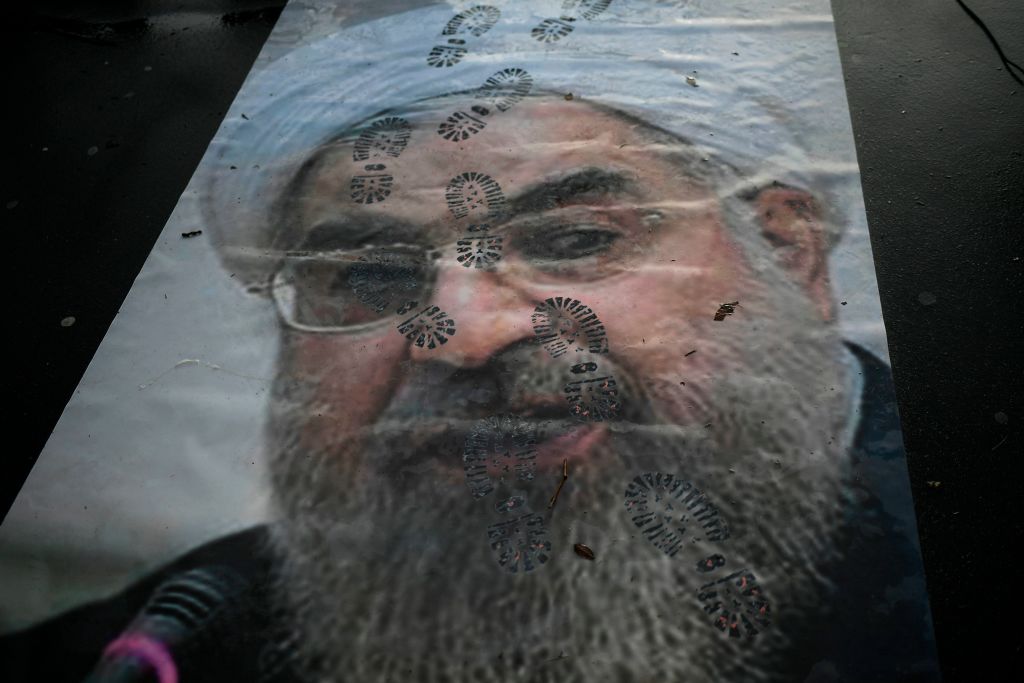Why is Jeremy Corbyn silent on the protests in Iran? A cynic might say that the Labour leader could hardly be expected to bite the hand that fed him £20,000 for appearing on the state’s propaganda channel. But Corbyn’s motivations are not financial. He and those who share his worldview simply cannot stomach being on the same side as the United States, even if that means abandoning Iranians crying out for democracy, justice and human rights.
That may shock soft-left indulgers of Corbyn but it shouldn’t. When the socialist journalist James Bloodworth contends that left-wing politics ‘has become so solipsistic that much of the time it operates strictly negatively’ he could be providing a character assessment of Corbyn or a neat summary of his outlook. America is the greatest source of evil in the world; other regimes may approach its wickedness but none can surpass it; resistance to American ‘imperialism’ takes priority over every other principle and precept. As Bloodworth puts it, ‘serious analysis on the left has given way to crude anti-western sentiment rooted in a peculiar – and class-bind – fetishisation of anyone who points an AK47 at Britain or the United States’.
Corbyn’s silence is perhaps wise given what the rest of that crowd has come out with so far. The Independent‘s Robert Fisk graciously conceded that ‘Iran is no Western-style democracy’ but warned that ‘comparing Iranian freedoms with American freedoms may not be a great idea right now’. Owen Jones, Doogie Howser turned political, eventually managed a tweet:
‘Solidarity with any Iranian protestors who are fighting for democracy and freedom, both from a vicious regime and from US domination.’
(He stuck a little clenched fist on the end to show he really meant it.) Corbynista blogger Aaron Bastani gasped:
‘Astonished at how many *still* don’t get cheering on protest whatever it’s demands and whatever the political context. Any breakdown in Iranian regime *could* make Syria look like theme park. Yet many Brits still cheer on regime change.’
This standpoint is left-wing only in the sense that it is espoused by many who call themselves left-wing. In truth, it is profoundly conservative.
In 1979, political scientist Jeane Kirkpatrick proposed a change to American foreign policy. ‘[T]raditional authoritarian governments,’ wrote the Young Socialist turned Cold Warrior, ‘are less repressive than revolutionary autocracies, […] more susceptible of liberalisation, and […] more compatible with US interests’. As such, the United States should work to fell left-wing regimes but leave their right-wing counterparts in place, provided they were pro-American.
‘Dictatorships and Double Standards’, published in the neoconservative journal Commentary, caught the eye of Ronald Reagan and upon his election to the White House, the Gipper made Kirkpatrick his ambassador to the United Nations, where she set about putting her theory into practice. The Kirkpatrick Doctrine, though never as dogmatically followed as its critics claim, nevertheless became a cornerstone of conservative thinking on America’s role in the world.
The left, with which Kirkpatrick had broken, scorned her doctrine. It was hypocritical, reactionary, coldly realist, and even apologetic for fascism. That thuggish strongmen like Augusto Pinochet should be left in power because they were geopolitically useful or ideologically tolerable to Washington DC, even as they oppressed and abused their own people, was morally obscene to progressives and democrats. The collapse of the USSR tugged at this conviction, Iraq pulled it under, and Iran may have drowned it. In its response to popular protests against the regime in Tehran, sections of the institutional left have evaded and excused anti-American tyranny in much the same way that Kirkpatrick indulged the sins of anti-communist juntas.
Democracy, like dictatorship, has its double standards. Self-styled progressives lambaste the United States for supporting Israel, which they fictionalise as a jackboot enterprise, while defending Venezuela, a nation in democratic and economic breakdown. They rightly excoriate the United States for propping up the theocrats in Riyadh but have formed their own unspoken alliance with the mullahs in Tehran. They jealously guard universal human rights at home but tolerate their suppression overseas where politically expedient. This double standard can even operate in the same country. The left’s campaign for human rights in Cuba begins and ends within the parameters of Guantánamo Bay.
The very hypocrisy radicals loathe in the United States they hoist aloft as their standard. Wilsonian on Palestine but Nixonian on Iran, their view of democracy changes depending on the political context. The Corbyn Doctrine is an anti-Western analogue of Kirkpatrick’s thesis: the absence of democracy in a country hostile to the Americans is tolerable when democracy would give succour to America or advance American objectives.
The most fervent adherents of US imperialism are not to be found in the White House, the Pentagon or the editorial page of the Wall Street Journal. They are the radicals who obsess over the US and place it at the heart of their politics. No territory — not Iraq, not Afghanistan, not Vietnam nor Korea — has been so throughly occupied by the United States as the mind of the anti-Western leftist. They are prisoners of the American national interest, forced to define what they are for by whatever America is against, compelled to abandon would-be comrades for fear of tangentially helping the Great Satan. In doing so, they expand US power farther than any neocon or warlike general has ever dreamed of. Every uprising, liberation struggle and democracy movement is tested by whether it will aid or undermine American global leadership and backed or neglected accordingly. Jeane Kirkpatrick, in her own away, would approve.







Comments